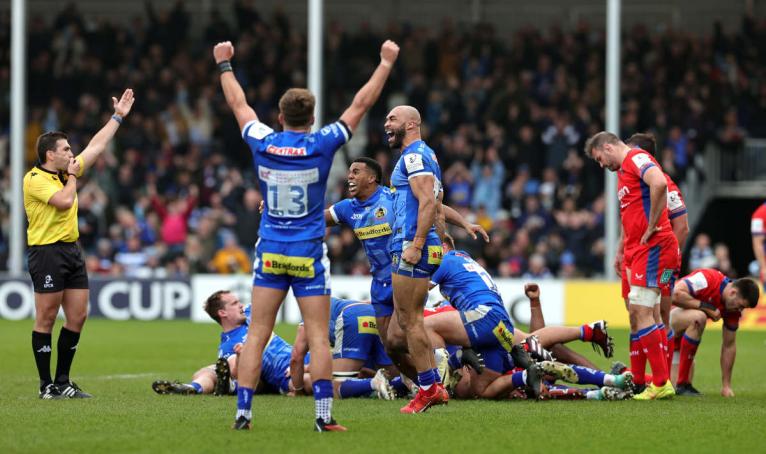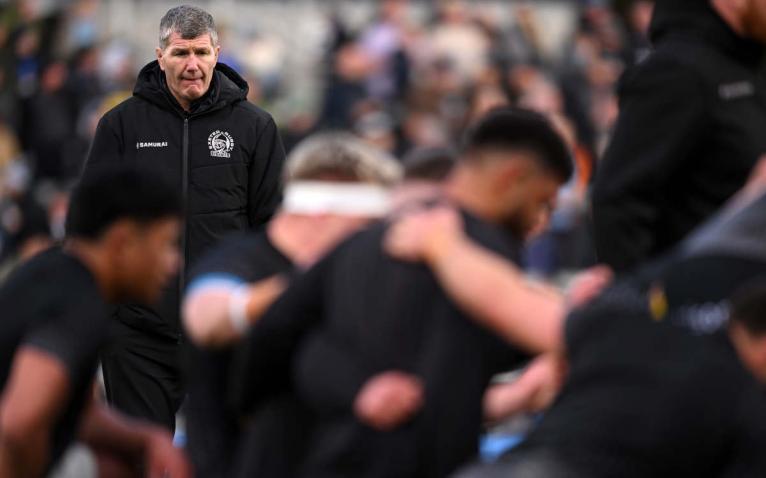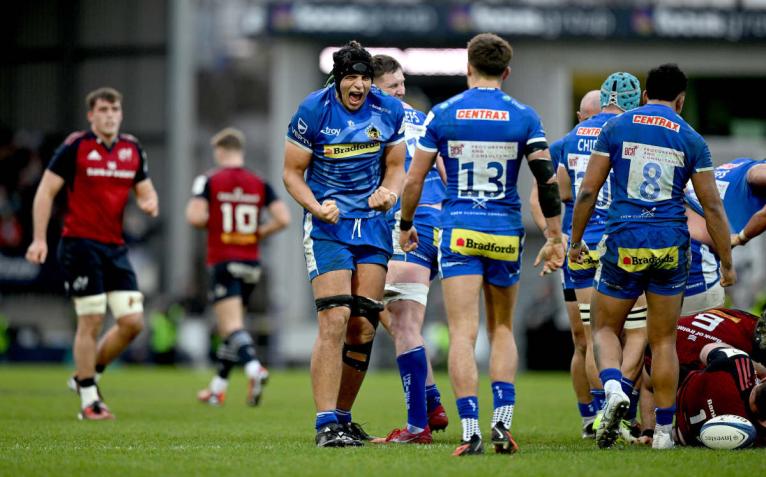Oh, we of little faith. As Exeter head to European grandees, Stade Toulousain, for their shot-to-nothing Champions Cup quarter-final, it would appear that reports of the demise of the Chiefs have been exaggerated. The tomahawk chop debate has also faded into the background, a state of affairs that appeared to be afflicting the team itself as they grappled with post-Covid challenges as well as a very public changing of the guard.
Even with an open chequebook – and perish the thought that anyone in professional rugby should spend beyond their means – a seamless transition from one dynasty to the next is a trick that few have managed in sport. Pep has got his Gulf billions to smooth the way while Alex Ferguson had to rely on a rasping tongue and shrewd strategic eye. On the rugby front, Bath managed it in the amateur era when their hard-nosed ways under Jack Rowell helped the one-time country cousins of West Country rugby eclipse their big city neighbours, Bristol, while, more recently, Saracens have done it their way. Er, moving on swiftly before the hate mob start oiling their larynx. Leicester, of course, have had their glory years, too.
And Exeter? So recent was their arrival in the big time – or so it seems for those of us for whom the turn of the century seems like yesterday – that it’s remarkable to think that the version of the Chiefs bound for the Stade Ernest Wallon on Sunday is probably Exeter 3.0, their third iteration since they first came to notice when they were promoted to the Premiership in 2010. They found their feet, they made strides and the doors to their trophy cabinet were eased open.

There is one principal reason why that happened and why it might be happening again, this coming together of talent to punch above its weight, and that reason is Rob Baxter. The 53 year-old was there when it was a matter of packing down and slogging through whatever came his way as a no-nonsense lock forward and long-standing Exeter captain, there again as the club with plenty of ambition but, crucially, plenty of common sense, too, began their climb towards the summit and, blow me, there he is still, scouting and assembling teams that are long on application and short on ego.
Of course, there are many other contributory factors, off field as well as on it. Having a plan is all very well. There are a lot of moving parts that have to inter-lock for that jigsaw to fit. But Baxter has been front and centre. As long as he remains so, Exeter are in good hands.
The retrenchment that Exeter were forced to undergo was no more than a re-alignment that every business in the land had to endure in those uncertain, parlous, post-pandemic months.
Exeter have been acclaimed for their success, culminating in their Double of 2020, that strange time in the land when the virus struck and we all cobbled our lives together as best we could. Chiefs chiselled that historic landmark during those desolate days. Covid was a hardship on so many levels and there was a period when it appeared as if the great commercial and sporting success story that was the Chiefs was being dented by an encounter with the buffers.
There is perception and then there is a more down-to-earth reality. Given the calamitous fate that afflicted Wasps – another club that had rightful claim to ‘dynasty’ status in the noughties – as well as London Irish with those self-same financial chill winds whistling through even the likes of Leicester, then the retrenchment that Exeter were forced to undergo was no more than a re-alignment that every business in the land had to endure in those uncertain, parlous, post-pandemic months.

The romantic notion of Exeter as merely a band of Devon and Cornwall brothers, the Nowells and the Slades and the Cowan-Dickies – was part truth, part distortion. They did trade on that identity and they did thrive together. But they were competing in a national and pan-European market place and the presence of a Dave Ewers and Don Armand or a Gareth Steenson was just as crucial. So, when the turnover came, brought on by Covid rigours as much as by age, and players such as Nowell, Cowan-Dickie and the Simmonds brothers, moved on, it appeared more a tumultuous upheaval than was actually the case. Quite simply, it was nature in action, the ebb and flow of life, as much as it was financial pressure.
Baxter didn’t sit on his backside and assume that everything would right itself. Nor did Rowe, a salty figure who is passionate about the club but not to the point of being a dewy-eyed sugar daddy prepared to chuck money around willy-nilly. Rowe is first and foremost a businessman, one who has used sharp elbows as much as his sharp mind to get to where he is. That he cares on all fronts has never been in doubt and explains his out-of-the-blue shot across the bows to ‘ the doubters’ a few weeks ago. ‘The world should think twice before they write off Exeter,’ wrote Rowe in an unheralded missive issued one Friday evening in early March.
Where once he scoured the local area as well as the Championship for the next generation, now he headed across the Severn Bridge and imported what now seems like obvious playing riches in the shape of Dafydd Jenkins, Christ Tshiunza, Joe Hawkins and Manny Feyi-Waboso.
Point taken, Tony, although ‘written off’ is a bit OTT. The change in personnel, particularly as it involved such seminal local characters as Nowell and Cowan-Dickie, was bound to excite comment. Factor in also that an assumption of success has never been in Exeter, make that Rob Baxter’s, DNA. Northampton Saints, Bath and, yes, Harlequins and others have every right to fancy their own chances.
Baxter got on his bike and made things happen. Where once he scoured the local area as well as the Championship for the next generation, now he headed across the Severn Bridge and imported what now seems like obvious playing riches in the shape of Dafydd Jenkins, Christ Tshiunza, Joe Hawkins and Manny Feyi-Waboso, Domino’s finest courier, too, Ross Vintcent, another spotted and lured. Baxter as a raider of the listing ark that is Welsh regional rugby has attracted plenty of interest from those who see him as some sort of Anglo bandido rather than the keen-eyed judge of potential that he is. Warren Gatland didn’t bother asking Feyi-Waboso who he fancied playing for. Baxter, meanwhile, left nothing to chance.

Exeter’s immediate prospects may not be too bountiful given that Baxter’s young, fledging side are up against one of the best-resourced, in-form teams in Europe, the number one seeds. Antoine Dupont and Romain Ntamack alone would give any opponent the jitters. Yet in beating Bath in the Round of 16 last weekend, their cause admittedly aided by the premature departure of Finn Russell, there was enough heft and thrust in the Exeter performance, enough on show of a muscled-up forward pack, enough promise in the obvious developmental form of an Ethan Roots or Greg Fisilau or Josh Hodge, to be persuaded that whatever happens at the Ernest-Wallon the Chiefs are right back in business. Tony Rowe, rest easy.


Not the club I support but a club that have to be admired for the way they go about there businesses.